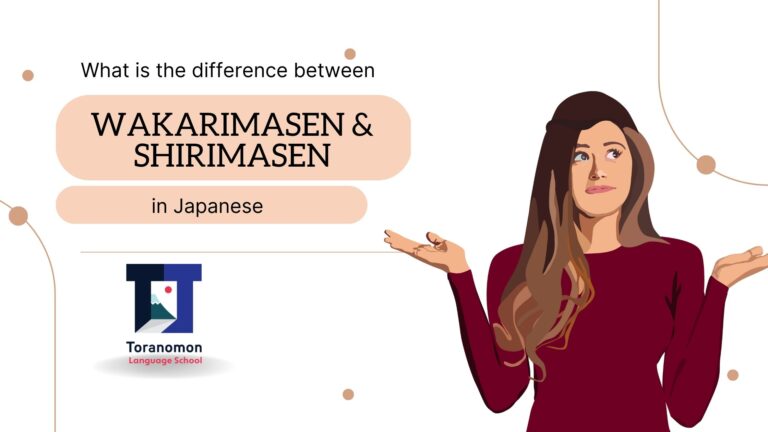When you start learning Japanese, you learn one word for everything. Everything is “tanoshii”, or “muzukashii”.. but eventually you expand your vocabulary, and learn many words that mean the same thing, just like in English – fun, enjoyable, pleasurable, and so on. How do you know when to use what? Context is everything. As you become more proficient in the language, you’ll likely come across nuances and subtleties that can significantly impact your communication. One such example is the distinction between “wakarimasen” (わかりません) and “shirimasen” (しりません), both of which can translate to “I don’t know” in English. However, they are used in different contexts and carry distinct connotations. This is how to use wakarimasen and shirimasen in Japanese.
Where did these words come from?
The roots of wakarimasen (わかりません) and shirimasen (しりません) can be traced back to classical Japanese. Wakarimasen is derived from the verb “wakaru” (分かる), which means “to understand,” while shirimasen comes from “shiru” (知る), which means “to know.” The “-masen” (ません) ending in both phrases is a polite negation, indicating that the speaker does not understand or know something.
Understanding the Differences
Wakarimasen (わかりません) is used when you don’t understand something, or the topic is beyond your current knowledge or capabilities. It implies that you’ve given some thought to the question or problem but couldn’t find the answer. This phrase is more suitable when you’re discussing abstract concepts, complex ideas, or personal feelings. It’s probably what you’ll learn first, so you’ll be used to frantically saying “wakarimasen!” while trying to speak over the phone!
On the other hand, shirimasen (しりません) is employed when you don’t possess the specific knowledge or information someone is seeking. It is more appropriate when discussing facts, data, or concrete details. However, using shirimasen in certain situations may come across as cold, indifferent, or dismissive.
Examples and Usage
Let’s look at some examples to better understand when to use wakarimasen and shirimasen:
今度の週末、東京に行く予定ですか?(こんどのしゅうまつ、とうきょうにいくよていですか?)
Are you planning to go to Tokyo this coming weekend?
Inappropriate: しりません (Shirimasen)
Appropriate: まだわかりません (Mada wakarimasen – I’m not sure yet.)
In this example, you’re discussing your plans, which requires a more personal and thoughtful response. Using shirimasen would be inappropriate, as it might imply indifference or a lack of interest.
最近、鈴木さんはどうしていますか?(さいきん、すずきさんはどうしていますか?)
How has Suzuki-san been doing lately?
Inappropriate: しりません (Shirimasen)
Appropriate: わかりません (Wakarimasen)
In this case, the question is about someone’s well-being. Responding with shirimasen might come across as cold or uncaring, whereas wakarimasen conveys empathy and concern.
昨日の会議の議題、覚えていますか?(きのうのかいぎのぎだい、おぼえていますか?)
Do you remember the topics discussed in yesterday’s meeting?
Appropriate: 知りません (Shirimasen)
Alternative: わかりません (Wakarimasen)
In this scenario, the question is about specific information related to the meeting. Both shirimasen and wakarimasen can be used, but shirimasen is more suitable, as it directly addresses the lack of knowledge. However, if you want to convey that you gave it some thought but can’t recall the details, wakarimasen would also be acceptable.
あの映画のタイトル、思い出せますか?(あのえいがのたいとる、おもいだせますか?)
Can you recall the title of that movie?
Appropriate: 知りません (Shirimasen)
Alternative: わかりません (Wakarimasen)
In this example, the question is about a specific piece of information – the movie title. Shirimasen is the most fitting response if you don’t know the answer. However, wakarimasen can also be used to imply that you tried to remember but couldn’t come up with the title.
彼女がどうして怒っているのか分かりますか?(かのじょがどうしておこっているのかわかりますか?)
Do you know why she is angry?
Inappropriate: 知りません (Shirimasen)
Appropriate: わかりません (Wakarimasen)
The question asks for your understanding of someone’s emotions. Using shirimasen would sound too detached, while wakarimasen is more suitable, as it indicates that you’ve considered the situation but can’t figure out the reason for her anger.
Informal Forms
When speaking casually, you can use the informal forms of these phrases: 知らない (shiranai) and わからない (wakaranai). Both can be used in a wider range of situations, but it’s essential to be mindful of the context and the relationship you have with the person you’re speaking with to ensure you don’t come across as rude or dismissive.
The subtle differences between wakarimasen (わかりません) and shirimasen (しりません) may seem confusing at first, but with practice and attention to context, you’ll soon master the art of using these phrases effectively. By understanding when to use each expression and considering the nuances, you’ll be able to communicate more naturally and empathetically in Japanese. Keep practicing, and if you have idea, use wakarimasen to be safe! If you want to practice with a native Japanese, TLS offers Japanese classes for beginners with a focus on natural language and real life use!

